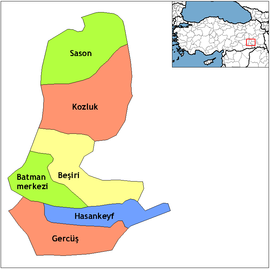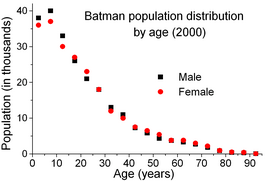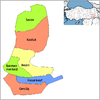Template:Infobox Province TR
Batman Province (Turkish: Template:Italics correction, Kurdish: Parêzgeha Batmanê, Arabic: محافظة بطمان) is a Turkish province southeast of Anatolia. The province's population exceeded 500,000 in 2010. The province is important because of its reserves and production of oil which was started in the 1940s. There is a 494-km long oil pipeline from Batman to the Turkish port of İskenderun. Cotton is the main agricultural product. A railway line connects Batman with the nearby provinces of Diyarbakır and Elazığ and with the capital Ankara. The Batman River flows though the area. Batman (Kurdish: Êlih, Arabic: باتمان Bātmān ) with 246,700 inhabitants, is the provincial capital. The province is also of interest from an archeological point of view. Sights include the Imam Abdullah Dervish monastery, Malabadi Bridge and the bridges of Camiü‘r Rızk and Hasankeyf. The majority of the province's population is Kurdish.[1]
History
The Batman Province contains the strategic Tigris river with fertile lands by its sides, as well as rocky hills with numerous caves providing a natural shelter. Therefore it was inhabited from prehistoric times, likely from the Neolithic (Paleolithic) period, according to archeological evidence. First documented evidence of settlements in the province dates back to 7th century BC. An artificial "island" was created in this marshy area. It was named Elekhan, and had an independent status for 194 years from 546 BC till the invasion of Alexander the Great in 352 BC. The Batman Province was a religious center in the 4th–6th centuries AD and a part of the Byzantine Empire. In the 11th–12th centuries it was ruled by the Great Seljuq Empire and Artuqids, a part of which was based in the province, in the city of Hasankeyf. The city is a cultural center of the Batman Province and as such was declared as a natural conservation area in 1981.[2]
Around 4th–6th centuries AD the province became an outpost of the Silk Road. It was populated by Assyrian (Syriac) Christians and also had a significant presence of Pontic Greeks, Baghdadi Jews and Armenians, who lived in the region from the 3rd millennium BC to the late 19th century. Tigranakert, the ancient capital of the ancient Kingdom of Armenia founded in the 1st century BC, was possibly located at Silvan in the Batman Province.[3] It was built by King Tigran the Great around 95–55 BC and named in his honor.[4]
Significant changes in the language and management of the province were brought in 1515 by Mahmoud Pasha Elekhani. It is believed that a variant of his name, Elah, was transformed into Iluh and gave the old name to Batman city.[5][6][7]
Development of oil fields resulted in relocation of Turkish people into a mostly Kurd-populated Batman Province. This brought ethnic conflicts which escalated in 1990s. More than 180 civilians were killed in the Batman city area by unidentified gunmen between 1992 and 1993.[8] The province became a stronghold of Kurdish Hezbollah and hosted its camp where the militants received political and military training.[9][10]
Recent individual incidents include the following: 1 Turkish soldier was killed and 2 wounded during clashes in the province on 15 April 2010.[11] In the Siirt Province 2 PKK militants were killed and 3 soldiers wounded.[12] One Turkish soldier was killed and 2 injured after a PKK attack on a Turkish military outpost on 7 July 2010.[13] Four Kurdish civilians were killed on 1 August 2010 after their vehicle struck a roadside bomb.[14] Later on 9 August 2010 5 PKK militants were killed in clashes with the Turkish military.[15]
Template:Wide image
Basic information
The province occupies an area of 4,649 km² (4,659 according to other source[16]) and is divided into six districts: Batman (capital, population 324,402 in 2008), Beşiri (32,282), Gercüş (26,111), Hasankeyf (7,412), Kozluk (62,114) and Sason (33,295).[5][17] There are 270 villages in the province.[18]
The population of the province is rapidly growing as a result of the inflow of workforce to the capital. Between 1990 and 2000, its population was rising at a rate of 5% per year. The population was stable in Beşiri and Gercüş, increasing by 1% per year in Kozluk and Sason and decreasing by 3% per year in Hasankeyf.[19] The total population was 510,200 in 2010 with 373,388 people living in the urban areas, mostly in the capital. It was 49.8% female.[20] The province lies in the mountainous area with the average elevation of 550 meters which contains several thousands of caves. The tallest mountains are Sason Dağları (2500 m), Meleto (2967 m), Kuşaklı Dağı (1947 m), Avcı Dağı (2121 m), Meydanok Tepesi (2042 m), Kortepe (2082 m) and Raman Dağı (1288 m). Several rivers (Turkish: Çayı) flow though the province, including Tigris, Batman, Sason and Garzan. The 115 km long Batman River flowing approximately from north to south forms a natural border between the Batman Province and Diyarbakır Province lying to the west. The historic Malabadi Bridge (built in 1146–1147) crosses the river near the town of Silvan. The Tigris flows from west to east, merges with the Batman River and exists the province. The Garzan River flowing from north to south enters the Tigris and separates Batman from the Siirt Province lying to the east.[21]
Oil industry
| Name | Discovered | Production started in |
Reserves (million bbl) |
Production (bbl/day, 2007) |
|---|---|---|---|---|
| Batı Kozluca | 1978 | 1980 | 138 | 1500 |
| Batı Raman | 1961 | 1962 | 1850 | 7000 |
| Dinçer | 1988 | 1990 | 55 | 400 |
| Garzan | 1951 | 1956 | 163 | 1700 |
| İkiztepe | 1988 | 1990 | 53 | 400 |
| Raman | 1940 | 1947 | 400 | 4000 |
Search for oil in the Batman Province was started in 1935. On 20 April 1940, oil was found at a depth of 1048 meters at the Raman oil field, south-east of Batman, nearby the city. The first experimental well started producing 10 tonnes (about 62 barrels) per day from 6 June 1940. The field was expanded for commercial production by 1945, but the production was delayed to 1947 by the lack of storage. A small refinery was built at the site with a capacity of 9 tonnes/day by 1947 and by November 1948 a bigger refinery capable of processing up to 200 tonnes/day was built in Batman. Even bigger refinery (330 tonnes/d) was built in Batman by 1955.[23] Several other oil fields were later discovered in the province with the Batı Raman oil field, which produces about 7,000 barrels daily, being the largest oil field in Turkey.[22][24] A 511 km long oil pipeline was brought in 1967 from Batman to the port city of Dörtyol near the easternmost point of the Mediterranean coast to transport the Batman crude oil. The pipeline has an annual capacity of 3.5 million tonnes and was transporting about 20 million barrels (about 2.7 million tonnes) in the 1990s and about twice less between 2003 and 2007. Another, short (41 km) pipeline connected Batman with Şelmo – the location of the second largest oil field in Turkey.[25] It was transferring between 1.5 and 0.5 million barrels per year in the period 1990–2007. Both pipelines are operated by BOTAŞ.[26][27]
Batman dam
The dam construction was started in 1986 and completed in 1999. It has a height of 85 meters and annual power generation capacity of 483 GWh (peak power 198 MW). The associated reservoir has a surface area of 49 km2 and a volume of 1.175 km3. The dam supplies water for the area of 37744 ha.[28]
Famous personalities
- Cigerxwîn (1903–1984) – Kurdish poet, writer, journalist, historian, lexicographer, and nationalist.
See also
- Ilısu Dam Campaign
- Sasun Resistance (1894)
- Sasun Uprising (1904)
- Southeastern Anatolia Project
- List of populated places in Batman Province
References
Cite error: Invalid <references> tag;
parameter "group" is allowed only.
<references />, or <references group="..." />External links
- Maps of Kurdish Regions by GlobalSecurity.org
- Map of Kurdish Population Distribution by GlobalSecurity.org
Template:Provinces of Turkey
Coordinates: 38°04′55″N 41°24′26″E / 38.08194°N 41.40722°E{{#coordinates:38|04|55|N|41|24|26|E|region:TR-72_type:adm1st |primary |name=
}}- ↑ Watts, Nicole F. (2010). Activists in Office: Kurdish Politics and Protest in Turkey (Studies in Modernity and National Identity). Seattle: University of Washington Press. p. 167. ISBN 978-0-295-99050-7.
- ↑ Hasankeyf, kultur.gov.tr
- ↑ Avdoyan, Levon. "Tiganocerta: The City 'Built by Tigranes'" in Armenian Tigranakert/Diarbekir and Edessa/Urfa. Richard G. Hovannisian (ed.) UCLA Armenian History and Culture Series: Historic Armenian Cities and Provinces, 6. Costa Mesa, California: Mazda Publishers, 2006, pp. 94–95.
- ↑ Template:Hy icon Hakobyan, Tadevos Kh. «Տիգրանակերտ» (Tigranakert). Armenian Soviet Encyclopedia. vol. xi. Yerevan: Armenian Academy of Sciences, 1986, pp. 699–700.
- ↑ 5.0 5.1 Batman, gap.gov.tr
- ↑ Batman. Genel Bilgiler, kultur.gov.tr, 18 June 2008 (in Turkish)
- ↑ Batman. Tarihçe, kultur.gov.tr, 21 February 2007 (in Turkish)
- ↑ Jonathan Rugman; Roger Hutchings (13 March 2001). Ataturk's Children. Continuum International Publishing Group. pp. 55–. ISBN 978-0-8264-5490-4. Retrieved 8 February 2011.
- ↑ Akkoç v. Turkey, Application Nos. 22947/93, 22948/93, Judgement of 10 October 2000, European Court of Human Rights judgment concerning Akkoç v. Turkey case, section II, C
- ↑ Human Rights Watch: What is Turkey's Hizbullah?
- ↑ Turkish troop killed in PKK clash [ WORLD BULLETIN- TURKEY NEWS, WORLD NEWS ]. Worldbulletin.net (2010-04-16). Retrieved 2010-08-20.
- ↑ "Two Kurdish PKK rebels killed in southeast Turkey". KurdishGlobe. 2010-04-17. Retrieved 2010-09-24.
- ↑ "No Operation". Press TV, Iran. Retrieved 2010-09-24.
- ↑ BDP'lilere mayın tepkisi. Samanyoluhaber.com. Retrieved 2010-08-20.
- ↑ "No Operation". Press TV, Iran. Retrieved 2010-09-24.
- ↑ Türkei, Europa auf einen Blick
- ↑ Population Statistics, Turkish Statistical Institute
- ↑ Balaban, Meltem Şenol Risk society and planning: the case of flood disaster management in turkish cities. PhD Thesis. Graduate School of Natural and Applied sciences, Middle East Technical University 2009, p. 21
- ↑ The Characteristics Of The Population By Provinces, 2000 Population Census. City and Village Population, Annual Growth Rate of Population, Surface Area and Population Density By Districts. turkstat.gov.tr
- ↑ Population Statistics, Turkish Statistical Institute
- ↑ Batman. Coğrafya, kultur.gov.tr, 21 February 2007 (in Turkish)
- ↑ 22.0 22.1 Gengiz Keskin and Cengiz Can. "Upper cretaceous carbonate reservoirs of the Raman Field, Southeast Turkey". Carbonates and Evaporites. 1 (1): 25. doi:10.1007/BF03174401.
- ↑ 23.0 23.1 History of petroleum, tpao.gov.tr
- ↑ Sacaeddin Sahin; et al. (2008). "Bati Raman Field Immiscible CO2 Application: Status Quo and Future Plans" (PDF). SPE Reservoir Evaluation & Engineering. 11 (4): 778–791. doi:10.2118/106575-PA.
- ↑ Selmo Oil Field, TransAtlantic Petroleum
- ↑ "Batman-Dörtyol Petrol Boru Hattı (Turkish)". BOTAŞ. Retrieved 2009. Check date values in:
|access-date=(help) - ↑ International Transport Forum; Organisation for Economic Co-operation and Development (30 April 2009). Intermodal transport: National peer review: Turkey. International Transport Forum. pp. 87, 94. ISBN 978-92-821-0222-0. Retrieved 9 February 2011.
- ↑ Batman Dam, General Directorate of State Hydraulic Works


